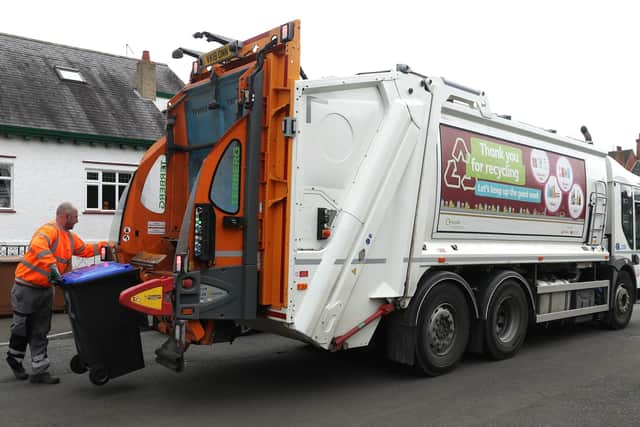Plan to combine Derbyshire bin collection contracts in bid to cut costs
and live on Freeview channel 276
A Derbyshire County Council meeting heard that major cooperative work is needed to prepare for national changes on the way for bin collections, including weekly separate free food waste pickups.
As it stands there are 12 separate contracts put out by Derbyshire’s district, borough and city councils for food and garden waste collections. In times of competition for the best deals, these smaller contracts are “inherently less attractive”.
Advertisement
Hide AdAdvertisement
Hide AdThis is why the county council is planning to pool the contracts into a “smaller number of higher value” contracts to reduce costs – if the district and borough councils and city council come on board.


Costs can be saved by councils requiring fewer bin lorries and depots, with contracts currently confined to smaller borough and district boundaries.
Individual councils would still be responsible for the actual collections, one of their legal statutory duties, while the county and city would continue to handle disposal – which is their own obligation.
County council officials gave the example of joint working between Bolsover District Council and North East Derbyshire District Council for recycling from 2010 onwards.
Advertisement
Hide AdAdvertisement
Hide AdHowever, when the firm carrying out pickups on behalf of the two firms – Ward Recycling – “collapsed” in early 2021, this showed the risk of the process.
While Bolsover and North East Derbyshire made savings of £2.5 million between 2010 and 2013, the collapse of the contract – which the county council carries the financial risk for – cost Derbyshire £1 million.
County council officials have not carried out calculations to work out how much money the cooperation on contracting could save but they are confident it would be significant.
Daniel Ayrton, the county council’s assistant director of resources and waste, told the meeting that more standardised recycling would be welcomed across Derbyshire and would enable savings.
Advertisement
Hide AdAdvertisement
Hide AdFor example, only Derbyshire Dales District Council collects food waste separately from any other kind of waste.
Meanwhile, Bolsover, Chesterfield, High Peak, North East Derbyshire and South Derbyshire collect food waste and garden waste in one bin. Amber Valley and Erewash do not recycle food waste.
Alongside this, Amber Valley and the Derbyshire Dales charge for garden waste collections, and Erewash is considering this move.
Mr Ayrton said the potential change on the way with weekly food waste collections, along with other changes, was a “once in a generation opportunity” to make improvements.
Advertisement
Hide AdAdvertisement
Hide AdChris Henning, the council’s executive director of place, said waste disposal takes up half of his department’s entire budget so any savings or moves towards “value for money” would have a greater impact.
Mr Ayrton said producers of packaging will, as of 2026/27, have to pay councils for the waste they have to recycle, in a bid to incentivise standardised packaging and more sustainable materials.
He said: “If all local authorities need to buy food collection vehicles at the same time there will be a bottleneck and we need to act now, to use our overall size and buying power and not compete against each other. We can use our whole buying power if we work more collaboratively. No one authority can deliver these kinds of changes on its own.”